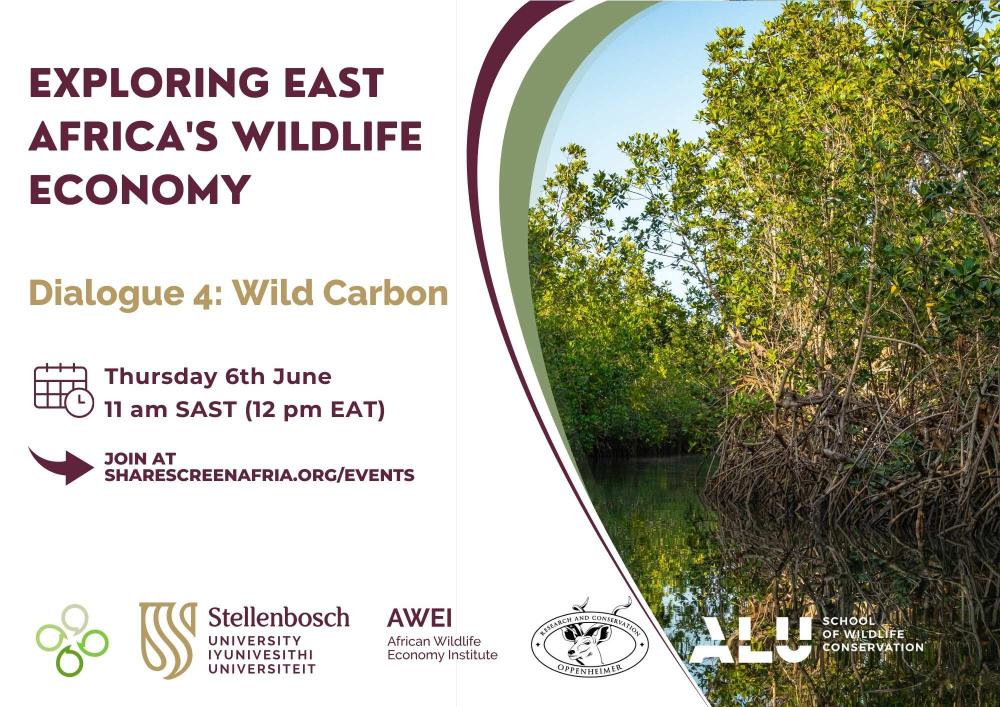
4 - Wild Carbon recording
Exploring East Africa's Wildlife Economy - a six-part dialogue series
Please click here to register
In this dialogue we explore the management of wild plants, such as mangroves, for carbon sequestration.
Webinar recording
- Mr Michael O'Brien-Onyeka
Executive Vice President, Global Partnerships
Nature for Justice
in conversation with
-
Mr Jerry Mang'ena
Executive Director, Aqua-Farms Organization (AFO) -
Ms Nkamunu Patita
Co-Founder and Kenya Lead, Earthacre - Mr Derrick Muyodi
CEO, Ceriops Environmental Organization
| A 60-minute discussion on Thursday 06 June starting at 12 noon EAT |
| Welcome and topic setting by the facilitator |
| Opening remarks by the guest speakers |
| Facilitated discussion based on preprepared questions and responding to inputs from the participants |
| Wrap up by the facilitator |
Global Mangrove Alliance brief on mangrove law and policy
Mangroves have a high value, both economic and non-economic. They provide habitat for 341 threatened species, ranging from crustaceans to tigers, and support 600 billion young shrimp and fish and 100 billion crabs and bivalves. They provide billions of dollars worth of ecosystem services, including an estimated $65 billion in coastal protection, sequester 21 billion tons of CO2, and support over 4 million small-scale fishers as well as high-value commercial fisheries. Mangrove ecosystems can sequester four times as much carbon per hectare as terrestrial forests...
The carbon sequestered by ocean and coastal ecosystems, or blue carbon, is increasingly recognized as a key nature-based solution to global climate change. Blue carbon ecosystems like mangroves are among the most effective carbon sinks on the planet, and their degradation contributes to 19% of carbon emissions from global deforestation. This potential has created growing interest in blue carbon credits...
In 2021, Member States of the Nairobi Convention adopted Decision CP.10/12/2(d) to develop a WIO Regional Mangrove Vision and Regional Mangrove Action Plan (RMAP). A Regional Policy Advisory Group of the Western Indian Ocean Mangrove Network confirmed the vision: “A healthy and resilient mangrove ecosystem in the WIO region by 2050 for the benefit of people and nature”... The RMAP is scheduled to be completed, endorsed and adopted by Member States in 2024. It is expected to create a framework for regional policy dialogues around mangroves to enhance mangrove-related policies and sustainable management in the Western Indian Ocean.
Get updates by email
Through impactful research, stakeholder engagement, and professional development, AWEI is supporting the wildlife economy across Africa. Please subscribe for occasional updates on our work and forthcoming events.
Sign up for a quarterly dose of AWEI insights
In a complex and changing world, AWEI generates strategic ideas, conducts independent analysis on wildlife economies, and collaborates with global scholar-practitioners to provide training and expertise for biodiversity conservation, climate resilience, and inclusive economic opportunities in Africa.
